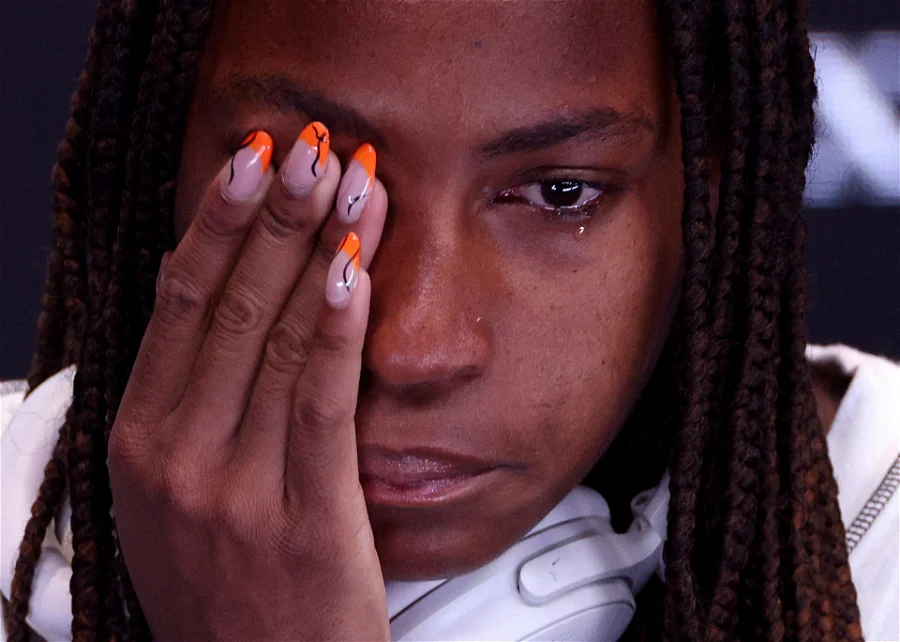
Coco Gauff, the American tennis sensation, recently graced the cover of Vogue’s April issue, captivating readers with a stunning shoot by renowned photographer Annie Leibovitz. The rising star was photographed in a dazzling gold Michael Kors gown, exuding confidence and grace as she continued to make her mark beyond the tennis court. However, while Gauff’s appearance was celebrated by many, it also became the center of an unexpected controversy when remarks were made about the shoot on *The Cutting Room Floor* podcast, hosted by womenswear designer Recho Omondi.
In a rare Vogue feature, Gauff’s cover was followed by another high-profile appearance—Zendaya on the magazine’s May issue, fresh off her role in the much-talked-about film *Challengers*. During the podcast episode, Omondi, alongside Zendaya’s stylist Law Roach, touched on various topics, including Coco Gauff’s photoshoot. The conversation took a critical turn, with Omondi expressing discontent about the execution of Gauff’s cover images.
As snippets from the podcast began to circulate on TikTok, they quickly attracted widespread attention. Among the many viewers was Gauff herself, who chose to address the criticism directly. In a heartfelt and candid response on TikTok, Gauff urged the critics to be mindful of the feelings of those being judged. “I understand your take,” she wrote, “but when criticizing, please consider the people on the cover’s feelings. To say it wasn’t beautiful is a tad bit mean—just say you felt it could be captured better.”
Gauff’s response struck a chord with her followers and highlighted the vulnerability often faced by public figures. She did not stop there. Visibly affected, the tennis star revealed that the critical remarks had sparked a wave of self-doubt. “I felt beautiful at first and after all the conversations, I cried and felt like it wasn’t beautiful,” she shared, her words conveying a deep sense of hurt. The backlash surrounding her photoshoot had clearly taken an emotional toll, turning what should have been a moment of pride into one of introspection and sadness.
Acknowledging her lack of modeling experience, Gauff humbly added, “I know I’m not a model or the prettiest, but just keep in mind the word usage when criticizing.” She emphasized that feedback can be constructive without undermining the subject’s confidence. “I know in the end you’re trying to advocate for better, but I think there’s a way to do that without commenting on the beauty of the picture. Comment on the lighting, unflattering angles, etc.”
The 20-year-old US Open champion’s comments sparked a wave of support from fans and followers, many of whom were quick to condemn the perceived insensitivity of Omondi’s remarks. They rallied around Gauff, expressing admiration for her courage in speaking out and offering words of encouragement. The public’s reaction made it clear that the tennis star had touched a nerve, bringing to light the often-overlooked emotional impact of public criticism on young athletes and celebrities.
In response to the backlash, *The Cutting Room Floor* podcast attempted to clarify their intentions. The official channel issued replies to Gauff’s comments, explaining that their critique was aimed at the photographic execution and not at Gauff herself. “You are gorgeous. No questions asked. I was speaking directly to how it was shot,” wrote Omondi, hoping to reassure Gauff and her supporters. “It was more of a critique of how the images are shot but not the subjects themselves! We love you, Coco.”
Despite the attempt at damage control, the incident shed light on the challenges faced by public figures in the age of social media. Even when the intention may not be to harm, words can have unintended consequences, particularly when directed at someone as young and influential as Gauff. The episode also underscored the importance of constructive criticism that focuses on technical aspects rather than diminishing the subject’s self-worth.
Through this difficult experience, Gauff demonstrated remarkable grace and maturity. She spoke up not only for herself but for others who might find themselves in similar positions. Her courage in addressing the issue resonated with fans, who continued to show their unwavering support. The incident served as a reminder of Gauff’s strength, both on and off the court, and highlighted the empathy and solidarity she inspires.
Ultimately, Coco Gauff’s Vogue cover represents more than just a glamorous photo shoot. It is a testament to her journey, her growing influence, and the challenges she faces as a young woman in the public eye. The overwhelming support she received in the wake of this controversy shows that, despite the criticism, she is cherished and respected by many. For Gauff, this chapter may have been a difficult one, but it also reinforced the strength of her character and the depth of the admiration she has earned.
Leave a Reply